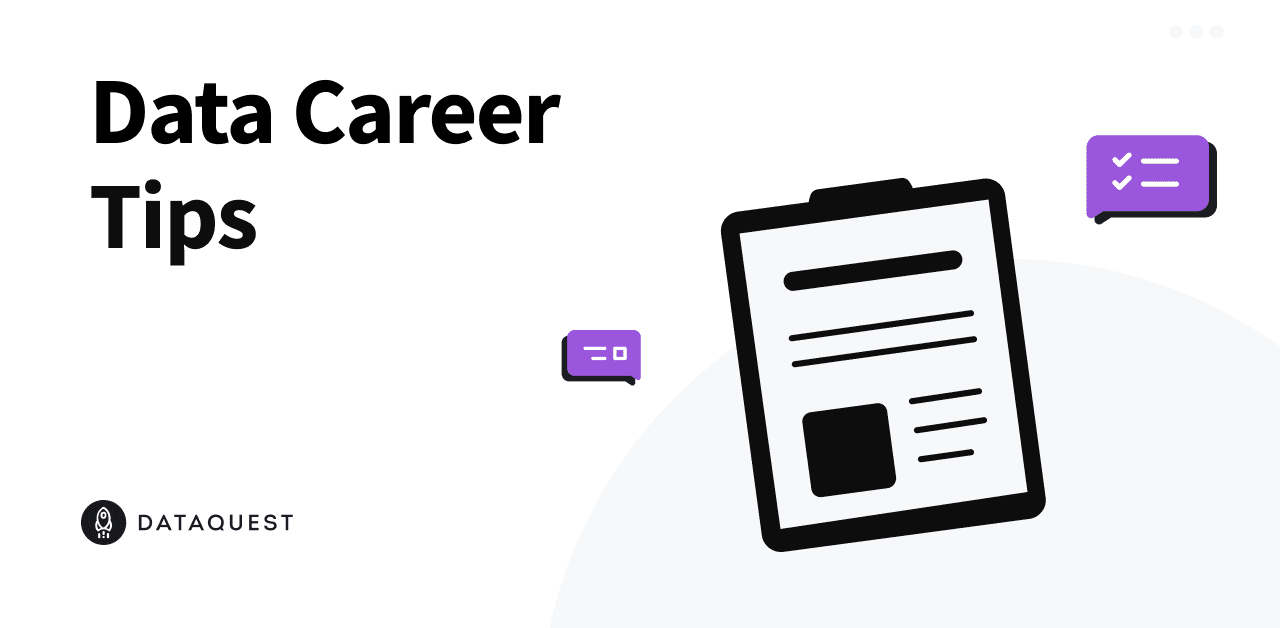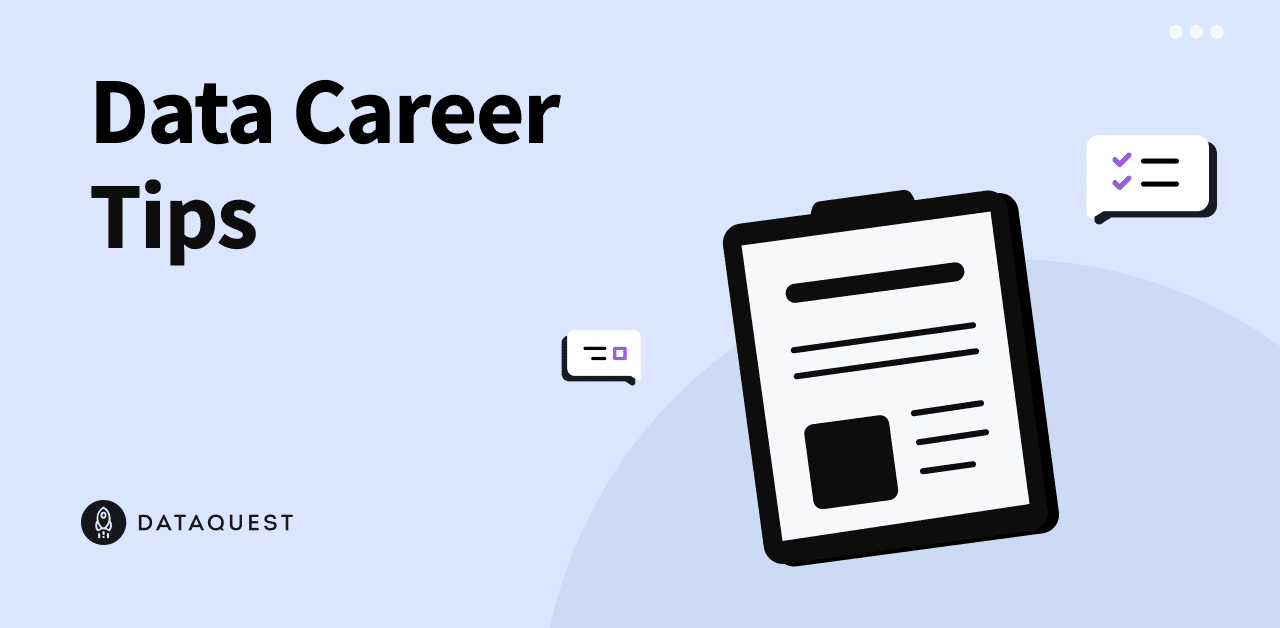How to Get Real-World Data Science Experience
For many up-and-coming data professionals, landing your first “real” data science job can feel like a bit of a “Catch 22.” You can’t get hired without a certain amount of professional data science experience, but you can’t get the experience without getting hired.
While it may seem unreasonable for employers to expect you to have a lot of experience immediately, data science is unique compared to some other fields. It’s critical that you actually have the skills you claim — and that you have proven them in a professional capacity before you get hired.
If you’re confused or intimidated by the seemingly daunting task of getting professional data experience, we’re here to help. Here are nine ways you can start getting real-world data science experience that will develop your career skills and strengthen your resume:
- Build a Portfolio of Personal Projects
- Collaborate on Open Source Data Projects
- Take on Data Science Freelancing
- Volunteer for Data Science Work
- Compete in Hackathons and Data Science Competitions
- Solve Practice Problems and Work on Case Studies
- Grow by Teaching
Build a Portfolio of Personal Projects
The key to getting noticed in data science is a powerful and compelling portfolio. Building the kind of portfolio that will catch the eye of a hiring manager takes effort, but it’s a must for anyone trying to start a career in data.
If you’re just getting started on your portfolio, it’s important to start small. Completing a large number of smaller jobs with measurable results is far more productive than trying to take on a massive project on your first try.
Start with simple things like collecting and cleaning a messy dataset, exploring the dataset, and using your findings to make predictions or discover problems. Assuming you set out to solve a data problem (which is an essential part of a data professional’s job), try creating your own machine learning model to solve the problem for you. Document your work, supply the code you used, and create meaningful visualizations to demonstrate your ability.
Platforms like Kaggle offer you many opportunities to do exactly these types of exercises, but you don’t want to limit yourself to only them. While Kaggle exercises are helpful, you’ll undoubtedly want to showcase your own data projects on your portfolio if you’re going to impress any potential employers.
Other platforms such as Omdena gives AI engineers and data scientists all over the world the opportunity to solve real-world problems in a collaborative environment. As an Omdena collaborator you have the chance to build AI solutions with world-renowned organizations like the UN Office of ICT, UNHCR, World Resource Institute, World Energy Council, World Food Programme, UNDP, as well as impact startups from over 35 countries.
Building a robust portfolio will compel you to explore new possibilities, develop your skills, and boost your confidence. Leverage GitHub as your personal data science billboard to showcase your portfolio. Also, make sure to keep an up-to-date resume and CV detailing any live projects you contributed to. It’s a good idea to be active on LinkedIn as well. Share your data science journey, and update it with any accomplishments, certificates, or successful projects you complete.
By going this extra mile, you’ll demonstrate to a hiring manager that you’re passionate about the field, highly motivated to learn, and capable of getting the job done.
Collaborate on Open Source Data Projects
In addition to working on your own projects, you can build experience by joining other data professionals on an open-source data project. By lending a hand to a collaborative project, you’ll benefit in a number of ways.
First, you’ll have incredible opportunities to put your skills into practice and gain experience with a wide variety of different data problems and solutions. Second, you’ll have the chance to network with many other data professionals. These experts in the field can show you the tips and tricks of the trade. Third, by collaborating with a network of data professionals, you’ll develop strong skills in teamwork and communication. Some people tend to focus on technical ability, but soft skills are invaluable in data science, and they can help you build a rapport with the hiring manager.
By joining in on open source projects, you open a door into the data science community, no matter your experience level. You’ll encounter many other professionals with similar interests and goals, discover new ways to fix old problems, and contribute to something greater than yourself. If you’re interested in collaborating on an open-source project, here are a few you might consider:
- Facebook AI’s DEtection TRansformer (DETR)
- Google’s Caliban for Machine Learning
- Real-Time Image Animation
- Caffe
Take on Data Science Freelancing
The ongoing pandemic has forced many businesses to transition to online spaces and make cuts to save money; this has consequently caused the gig economy to explode. As such, one way you can start getting real-world, paid experience would be to start freelancing your data science services.
If you have some marketing knowledge, you can create your own brand and market your services through websites or branded social media accounts. But if you’re not a natural salesman, there’s still hope! There are several platforms available to anyone who wants to offer their services on a gig basis:
The benefits of freelancing are many. To start, you can take on as few or as many jobs as you can handle, which allows you to practice your multitasking skills. Because of the nature of the work, you’ll also acquire incredibly varied experience with diverse datasets and data teams. If there is a particular type of data problem that you’re interested in solving, the odds are good that you’ll be able to find a short-term freelance project that will allow you to gain more experience with it. Once you’ve completed a few gigs, you’ll be able to prove your success to hiring managers. You will be able to present extensive and varied real-world work experience, shining testimonials, and a passion for helping businesses overcome challenges.
Volunteer for Data Science Work
Many data professionals overlook the opportunities they can gain by volunteering to assist nonprofits with their data science needs. While this work is unpaid, many of the same benefits of freelancing apply. By volunteering to help a greater cause, you’ll gain practical and varied experience in data science, while building a reputation as a dedicated professional with a passion for solving data problems.
This valuable experience will enable you to collect professional references and reinforce the skills on your resume. Not only that, but these hours spent volunteering will also provide excellent topics of discussion during a job interview! Plus, you never know when that volunteer work might turn into a paid position.
Another benefit of volunteering: there’s ample opportunity for it. Here are a few platforms you can use to volunteer your data skills:
Compete in Hackathons and Data Science Competitions
Few things push people to improve their skills like healthy and productive competition. Hackathons and data science competitions provide a unique occasion to display your workplace readiness by putting your skills to the test. They also give you fantastic opportunities for networking and learning from the mistakes and triumphs of others.
If you haven’t had much professional data science experience, these competitions can demonstrate that you have some valuable skills. The entire objective of these events is to create a high-pressure and high-stress environment in which participants must solve complex problems and translate hypotheses into action. In doing so, these events closely mirror the reality of work in data science. Problem-solving, creative improvisation, and beating deadlines are all part of the package. Listing a good performance from one or more data science competitions would be quite an addition to your resume, and you might even snag some cash prizes along the way.
If this sounds like something for you, here are a few options:
- Kaggle
- Analytics Vidhya’s DataHack platform
- International Data Analysis Olympiad (IDAHO)
- DrivenData
- TopCoder
Solve Practice Problems and Work on Case Studies
Many data professionals have a few MOOC certifications under their belt, but they’re often not enough to convince employers that you’re job-ready. If you want to take your skills to the next level, you can start with practice problems and case studies.
It can never hurt to be solid on the fundamentals, especially considering the indispensable importance of certain tools and hard skills required in data science. With that in mind, it’s worthwhile to put in the extra hours working through as many data problems as you can until the basics become second nature; you’ll be able to perform better than if you hadn’t gone the extra mile.
Dataquest is centered on this kind of extra practice. In fact, it’s the basis of our entire teaching method. Throughout our courses, you’ll complete practice problems and guided projects that will help you develop, refine, and retain your data science career skills. Take some time to boost your proficiency and broaden your experience with diverse datasets and challenges:
Grow By Teaching
Teaching data science concepts to others will greatly benefit you in closing any potential knowledge gap you may have. Sharing your knowledge with the world not only leads to gaining practical experience, but it will also make you stand out in front of hiring managers.
Whether it's through a blog or videos, you can broadcast your expertise by explaining projects you've completed or solved. Gaining experience goes beyond just being able to perform technical tasks. Showcasing that you're an effective communicator and avid learner will reduce chances of getting rejected when applying to data science jobs.
With all of these things in mind, it’s important to observe that “professional work experience” is not likely to fall into your lap; it’s something you’ll have to go out and seek. You may have to try several different routes and practice some trial and error, but at the end of the day, it’s all about getting the experience. That’s what hiring managers are looking for: a demonstration of skill through practical, real-world data science experience, and they don’t particularly care where you got it from or how much you were paid for the work.

